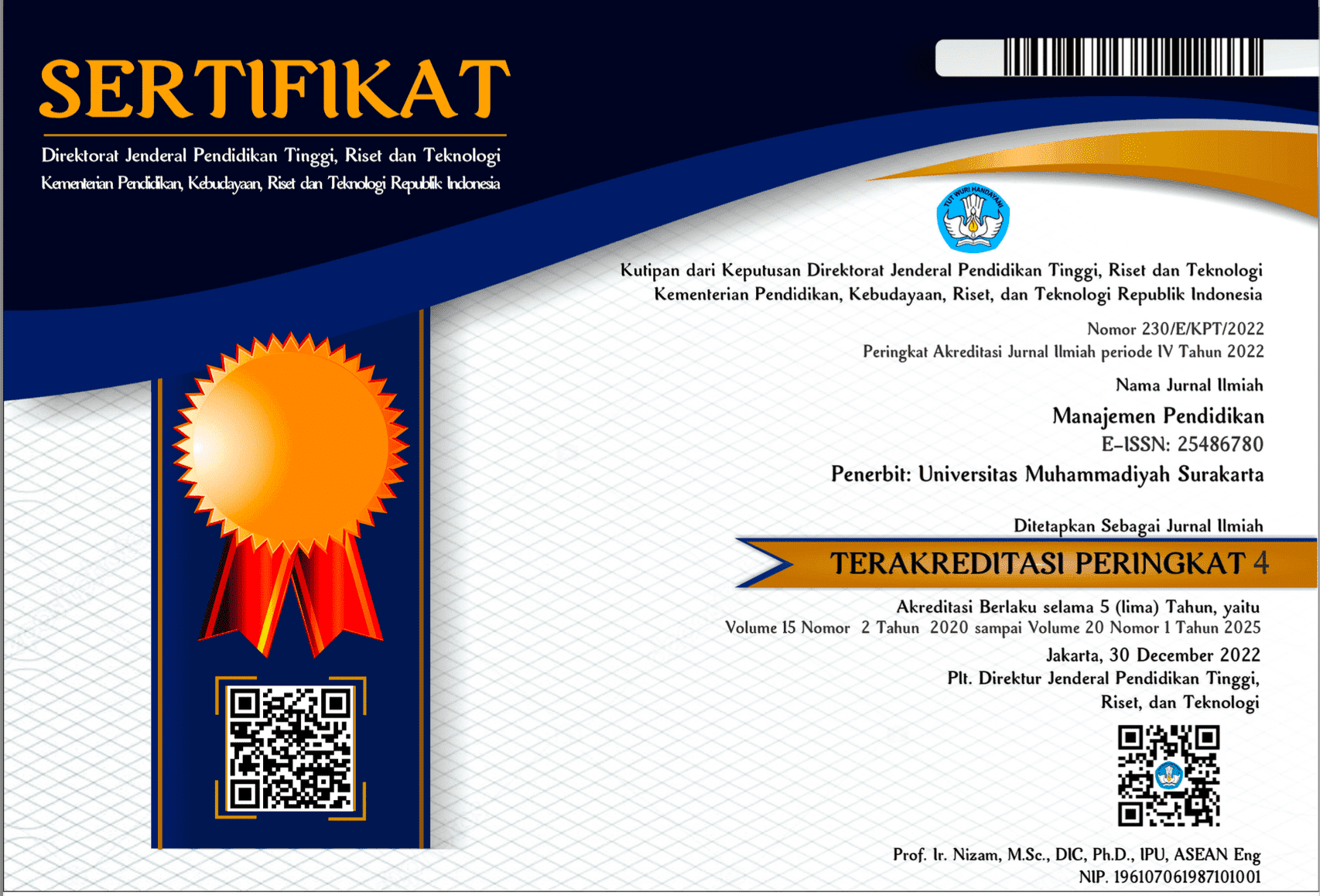Tanggung Jawab Siswa Dalam Pembelajaran Matematika SMA
Desi Dwi Hastuti(1*), S. Sutama(2), Djalal Fuadi(3)(1)
(2)
(3)
(*) Corresponding Author
Abstract
This study aims to describe the forms, characteristics, and consequences of student
responsibility in learning mathematics. This research is a qualitative research with
ethnography design. Techniques of collecting data using interviews, observation, and
documentation. Data analysis techniques use interactive model analysis. The results
of this study: 1) The forms of student responsibility in learning mathematics in high
school such as responsibility as individuals, religious people, students, and citizens.
Student responsibilities collect the task thoroughly and follow the learning math well. Subject teachers assess the competence of knowledge and skills. BK teachers and religious teachers assess the competence of spiritual and social attitudes. 2) The characteristics of student responsibility in learning mathematics in high school done by completing the task well, ready to bear the burden and bear the risk, keeping promises, and can feel the difficulties of others. By following the extracurricular, students learn responsibility for the task. The teacher reminded the task and made a bill for who has not collected the task. 3) The consequences of student responsibility in high school mathematics have some advantages such as being able to help themselves, be effective in helping others, and be trustworthy. Cooperative learning can increase interaction among students and help each other in completing the task.
Keywords
Full Text:
PDFReferences
Bacon, C. (1990). Response-Ability. American Secondary Education, 18(2), 15-18. Retrieved from http://www.jstor.org/stable/41063912
Bruner, J. (1960). On learning mathematics. The Mathematics Teacher, 53(8), 610-619. Retrieved from http://www.jstor.org/stable/27956266
Crisan, A. (2013). Virtual Classrooms in Collaborative Projectsand The effectiveness of The Learning Process. 76, 226-232. Retrieved from www.sciencedirect.com
Drew, P., Robert, A., Martin, C., & Mraz, M. (2015). Perceptions of The Roles and Responsibilities of Elementary School Mathematics Coaches. 2, 126-141. Retrieved from www.emeraldinsight.com/2046-6854.htm
Fagimovich, I. (2014). Development Of Student’ Civil Responsibility In The Process Of Social Projecting. 191, 801-804. Retrieved from www.sciencedirect.com
Fingarette, H. (1966). Responsibility. Mind, 75(297), new series, 58-74. Retrieved from http://www.jstor.org/stable/2251710
Hamzah, A. (2014). Perencanaan dan Strategi Pembelajaran Matematika. (1). Jakarta: PT Rajagrafindo Persada
Hansson, Å. (2010). Instructional responsibility in mathematics education: Modelling classroom teaching using Swedish data. Educational Studies in Mathematics, 75(2),
-189. Retrieved from http://www.jstor.org/stable/40928554
Hansson, Å. (2012). The meaning of mathematics instruction in multilingual classrooms: Analyzing the importance of responsibility for learning. Educational Studies in Mathematics, 81(1), 103-125. Retrieved from http://www.jstor.org/stable/23254221
Karp, K., & Howell, P. (2004). Building Responsibility for Learning in Students with Special Needs. Teaching Children Mathematics, 11(3), 118-126. Retrieved from http://www.jstor.org/stable/41198461
Lee (1997). How High School Organization Influences the Equitable Distribution of learning in Mathematics and Science. 70(2), 128. ProQuest Document Link.
Lickona, T. (2013). Educating For Character. (2). Jakarta: Bumi Aksara
Matteucci. (2018). Who is Responsible for Educational Outcomes? Responsibility Ascriptions for Educational Outcomes in A Sample of Italian Teacher, Parents, and Students. 10. Retrieved from www.elsevier.com/locate/lindif
Meaney, T., & Evans, D. (2013). What is the responsibility of mathematics education to the
Indigenous students that it serves? Educational Studies in Mathematics, 82(3), 481496. Retrieved from http://www.jstor.org/stable/23434474
Nashir H. (2013). Pendidikan Karakter Berbasis Agama dan Budaya. (1). Yogyakarta: Multi Presindo
Niculescu, R. (2013). Human Resources as Leading and Supporting Actors of a Curriculum Reform. 81, 122-125. Retrieved from www.sciencedirect.com
Niculescu, R. (2013). Religious Education an Important Dimension of Human Education. 93, 338-342. Retrieved from www.sciencedirect.com
Odafe, Victor U (1998). Students Generating Tes Items: A Teaching and Assessment Strategy, 91(3), 198-202. ProQuest Document Link.
Orlove, B., Lazrus, H. Hovelsrud, G. & Giannini, A. (2014). Recognition and Responsibilities, 55(3), 249-275. Retrieved from ttp://www.jstor.org/stable/10.1086/676298.
Pendergrass, R. (1982). A “Thinking” Approach to Teaching Responsibility. The Clearing House, 56(2), 90-92. Retrieved from http://www.jstor.org/stable/30186162
Spencer, M., Dupree, D., & Swanson, D. (1996). Parental Monitoring and Adolescents’ Sense of Responsibility for Their Own Learning: An Examination of Sex Differences. The Journal of Negro Education, 65(1), 30-43. doi:10.2307/2967366
Simacheva (2016). Trust Development in One’s Self and in Others of University Students Engaged in Innovative Activity, 36, 15-17. Procedia-Social and Behavioral Sciences
Spivak, G. (1994). Responsibility. Boundary 2, 21(3), 19-64. doi:10.2307/303600
Subur. (2015). Pembelajaran Nilai Moral dan Berbasis Kisah. (1). Yogyakarta: Kalimedia
Sugiono. (2010). Metode Penelitian Bisnis. (15). Bandung: Alfabeta
Sumardjoko. (2015). Metodologi Penelitian Kualitatif. (1). Surakarta: Universitas Muhammadiyah Surakarta.
Sutama. (2016). Metode Penelitian Pendidikan. (2). Surakarta: Fairuz Media.
Zahra, T., Amineh A., & Maryam M. (2015). The Effect of m-Learning on Mathematics Learning, 171, 83-89. Procedia-Social and Behavioral Sciences.
________. Pendidikan Anti Korupsi SMA/MA Kelas X.
________. Pendidikan Anti Korupsi SMP/MTS Kelas VII.
Article Metrics
Abstract view(s): 1372 time(s)PDF: 8788 time(s)
Refbacks
- There are currently no refbacks.










